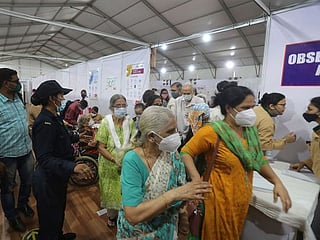Kerala polls: Will the ‘tyranny of the minority hold sway’?
Minuscule percentage of voting public are key to poll outcome in southern Indian state

Throughout history, democracy has always been adulated as the rule of the people, the form of governance where the common man decides to choose the people who will run the affairs of the state. An oft-quoted Latin proverb — ‘Vox populi, vox dei’ (the voice of the people is the voice of God) — the title of a Whig tract of 1709 in England — stands testimony to this.
However, a little quirk in the phenomenon of democracy is often overlooked. Former US President Thomas Jefferson called it the ‘politics of faction’ — where small groups within the polity have a larger-than-life impact on governance. It is often also termed as the ‘tyranny of the minority’.
I know the political pundits would troll me for this, but I feel this truism comes out in a rather interesting way in the politics of the southern Indian state of Kerala.
Let us take a look at the politics in the state to demonstrate my theory.
Truly bipartisan politics
There are two main political groupings in Kerala — the Left Democratic Front (LDF) led by the Communist Party of India (Marxist) and the United Democratic Front (UDF) led by India’s Grand Old Party, the Congress. Between the two, the two political alliances have ruled the southern state since independence. In general, the voters have never retained any alliance for more than a single term.
The support base of the two alliances are also reasonably entrenched. If one goes through the history of the voting patterns in the state, it is easy to find that each grouping in general commands about 37-40 per cent of the total votes polled.
Herein lies the twist. If we look a little more closely, we will see that the voting pattern reveals that in each of the elections to the state legislative assembly, the winning alliance has won a little over 40 per cent of the total votes polled. The losing alliance took around 36-37 per cent of the total votes.
Thus, if you analyse, it is apparent that about four per cent of the total votes polled have decided who will win the elections in the state! Is this not a ‘tyranny of the minority’?
In many ways, Kerala is the closest that Indian polity has in terms of a truly bi-party democracy. As we saw earlier, the two political alliances have more or less entrenched vote bases. This is also a reflection of the state’s high scores on the human development index.
Top of human development index
It is the most literate state, its state health care system is probably the best in the country, the agrarian/industrial combine is also almost without parallel in India. Thus strong economic growth, and the social laurels that it has brought about, has been a critical factor in the mature politics of the state.
Probably as a result of the high literacy rate, the politics of Kerala has always tended to lean towards left-of-centre. It returned the first leftist government with the veteran EMS Namboodiripad as the first non-Congress chief minister of India as far back as in 1957. Ever since then, almost in every election, the incumbent government has been voted out of power.
Also, it is because of this trend that the country’s ruling party at the Centre, the BJP, has yet to make any significant dent in this established political equation. While the saffron party’s leaders are making brave noises, as of now it seems unlikely that the BJP will be able to take any major share of votes.
So what do the upcoming elections hold for the future of the state? Early opinion polls suggest that there may be a change in the pattern of the anti-incumbency factor ruling the roost. The current LDF, led by chief minister Pinarayi Vijayan, is predicted to hold on the power, albeit with a reduced number of seats.
It is possible that the voters may choose to reward Vijayan with another term, mainly due to the initial handling of the COVID-19 pandemic, so expertly handled by health minister KK Shailaja.
If this happens, it will mean another body blow to the Congress, and its heir-in-waiting, Rahul Gandhi. It would add to his already dismal track record at the helm of affairs at India’s GOP, as he has failed repeatedly in garnering success for the party.
More so, since Gandhi is a sitting Member of Parliament from Kerala’s Wayanad, which saved him blushes after he was routed from his family stronghold of Amethi in Uttar Pradesh in the 2019 parliamentary elections by the BJP’s Smriti Irani.
However, these are still early days. The state is scheduled to go to polls on April 6 for its 140 seats. The interesting factor is that this will be a single-phase election, meaning that all the seats will be voted for on the same day.
This, again, indirectly is a thumbs-up for the LDF and its management of law and order in the state, as it means the Election Commission is satisfied with the state of affairs in this matter.
So, will the ‘tyranny of the minority’ swing towards the opposition, or stay with the Left? We will know soon.
Sign up for the Daily Briefing
Get the latest news and updates straight to your inbox









